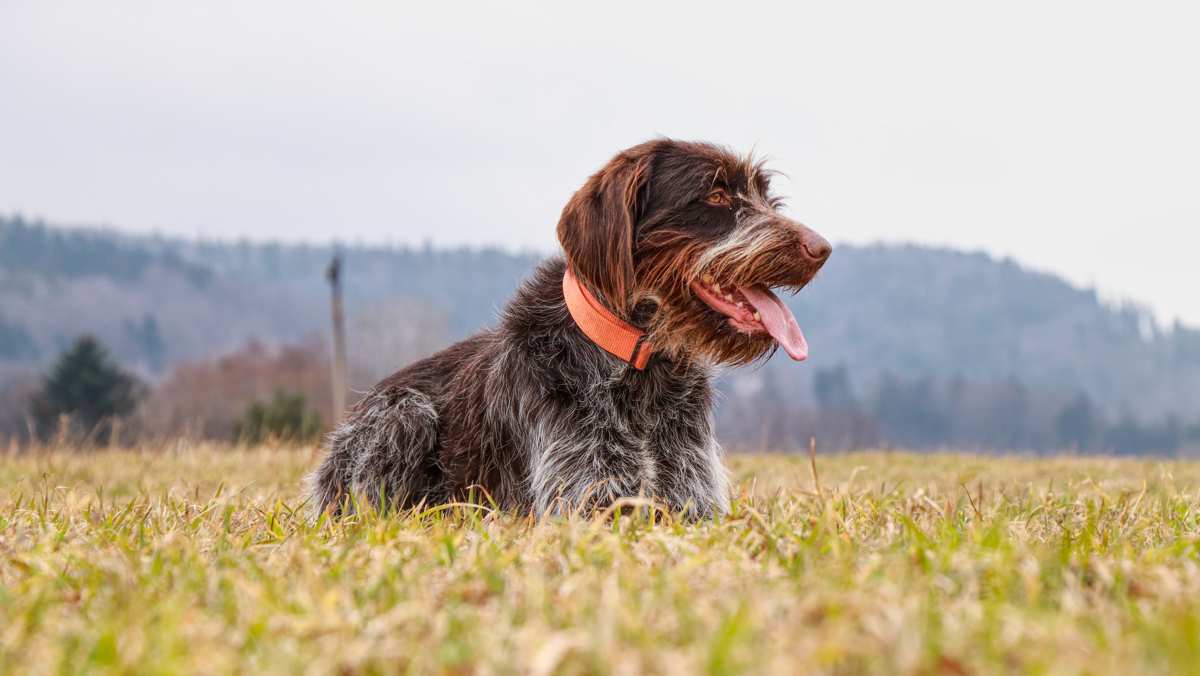Cesky Fousek Breed Details
Below are the details and specs for the Cesky Fousek dog breed.

The Cesky Fousek (pronounced "CHESS-key FOW-sek"), also called the Bohemian Wirehaired Pointing Griffon or the Rough-Coated Bohemian Pointer, is a rare hunting breed native to the Czech Republic. (Some people refer to a female as a Ceska Fouska, but most use the original name for both sexes) This breed possesses excellent pointing instincts, and incredibly high energy to go with them. Their playful spirit, while annoying to some, will endear Ceskys to children; they mix quite well with other pets, and make great additions to any household, especially those who live in the country. In regards to training and exercise, you could say members of this breed are "moderate maintenance" but they make up for that by requiring very little grooming. This is an appropriate choice for those owners that are choosing a pet based upon chance to have health issues; they are notoriously hardy and typically live 12-15 years.
Below are the details and specs for the Cesky Fousek dog breed.
A medium-sized breed. Male Ceskys weigh 60-75 pounds, and stand 24-26 inches tall at the shoulder; females weigh 45-60 pounds and are 22-24 inches in height.
Ceskys are high-energy, intelligent, and loyal dogs that are easily trainable. Due to their breeding, they are excellent hunting dogs that make great family pets; they possess incredible energy that can overwhelm a first-time owner. Ceskys love children and do well with other pets, but may be suspicious of strangers.
As a low-maintenance breed, a Cesky will require little grooming. These dogs respond very well to training so, with patience and a confident demeanor, this should not be overly difficult. Members of this breed will need plenty of exercise, at least one-hour outdoors per day.
Though the Cesky's exact origin is unknown, references to these types of Bohemian pointing dogs, which historians agree are the ancestors of the modern Cesky, are found in records dating back to the 1300s. In the late 19th century, an author in the region of Bohemia (now known as the Czech Republic) published a book that gave details of the fousku, the Czech word for "rough-haired pointing dogs"; a short while later, a group of breeders and hunters in metropolitan Prague formed a club called Cesky Fousek – the Society for the Rough-Haired Pointer – that ultimately gave the breed its official name.
Though this loose association of breeders continued, World Wars I and II nearly caused the breed to become extinct. The club sought to revive the purebred Cesky's existence in the 1950s when Czechoslovakia joined the Fédération Cynologique Internationale (FCI), the official international canine organization, and were finally successful when the FCI recognized the Cesky Fousek as a pure breed in 1964. In the latter 20th century, a Czech doctor named Jaromir Dostal became known as the world's leading Cesky Fousek expert.
Today, though these dogs are still somewhat rare outside the Czech Republic, Cesky Fousek breeders exist all over the world.
Ceskys possess a wiry, "triple-layered" coat that has an extra, bristly "guard" layer in addition to the typical under- and topcoat; most Ceskys also have moderate facial hair around the nose and mouth. The breed's athletic body is generally about equally proportionate in height to length. The head is long and narrow, eyes almond-shaped and hazel in color, and ears long, floppy, and rounded slightly. The breed's neck is medium-length and somewhat arched, the chest is deep and usually hairy; the legs are slender but muscular. The medium-length tail is set high, carried horizontally, and is often docked by half.
The images below represent the coat colors and patterns associated with Cesky Fouseks.

Hard-working, intelligent, eager, and adaptable, Ceskys are affectionate and easily trainable dogs. Whether crashing through the woods on a hunt or curled in its owner's lap, this breed is an obedient and loyal companion. Ceskys are highly energetic and playful, sometimes to a fault; since they remain puppies for up to three years, they will often exhibit immature behavior such as barking and digging holes. Likewise, Ceskys are very people-oriented, and will become bored and lonely if left alone for extended periods, which can lead to destructive behavior. Because of its strong hunting instinct, a Cesky will "go on point" at nearly any object – people, other animals, even cars – it thinks its master should notice.
Ceskys are generally low-maintenance dogs. Their coats require little grooming; they are easily trained, and thoroughly enjoy the attention given them during training activities; and they will require a good deal of exercise, though they enjoy those activities as well.
Ceskys' triple coats shed only moderately, and are easy to maintain. Brushing is required every two weeks or so; baths are needed only once every 2-3 months. When you become accustomed to the rate at which your pet's ears, eyes and nails need to be cleaned it is best to get on a schedule of checking and maintaining these areas to avoid unnecessary health issues.
This breed will require a great deal of exercise, or else it will become restless and destructive. As a natural hunting dog, a Cesky will be perfectly at home running in the woods or other similar outdoor activity; otherwise, this breed will require at least one hour-long walk or jog every day.
Because of their love for the outdoors, Ceskys are best suited for homes with yards; apartment living is not recommended for this breed.
Life expectancy is 12-15 years. This is an extremely robust and healthy breed; the only known health issues are hip dysplasia and alopecia (partial or complete absence of body hair), and these are rare.
Below are potential health concerns associated with Cesky Fouseks.